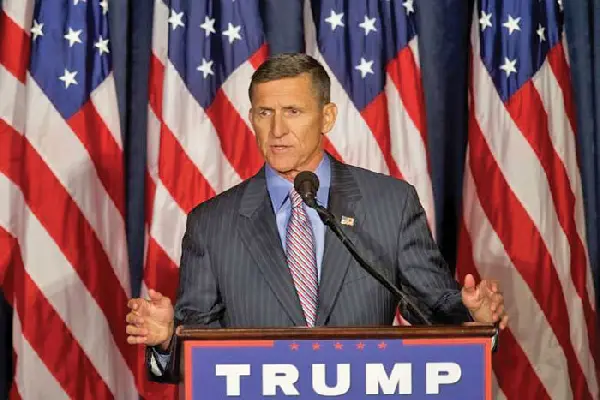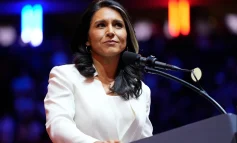
|
| Flynn |
WASHINGTON — While much discussion has been focused on President-elect Donald Trump’s cabinet, only five names have been officially confirmed.
In the weeks to come, Trump must choose thousands of appointees to oversee security, economy, foreign affairs and domestic policies during his term. But much disarray has already gone into the process, with dozens of names floating around as possible contenders for key positions and the president-elect is facing sharp criticism from civil rights groups and Democratic leaders over some of his picks so far.
Below is a list and min-biography of Trump’s five picks:

CHIEF STRATEGIST
Steve Bannon
Bannon joined Trump’s campaign as CEO in August after serving as the head of Breitbart News — a far-right outlet that is one of Trump’s biggest backers. The outlet has consistently provided a platform for anti-Muslim rhetoric, allowing bigots such as Pamela Geller and Frank Gaffney to spread ignorance and fear among its readers.
Bannon, 62, worked for Goldman Sachs, then started his own media-focused boutique investment banking firm. After selling the business, he became a film producer, which introduced him to conservative publisher Andrew Breitbart and author Peter Schweizer.
The Southern Poverty Law Center (SPLC) defined Bannon’s Breitbart News as “a loose set of far-right ideologies at the core of which is a belief that ‘White identity’ is under attack through policies prioritizing multiculturalism, political correctness and social justice and must be preserved, usually through White-identified online communities and physical ethno-states.”
Jewish groups, civil rights groups and a long list of Democratic leaders have denounced Bannon’s hiring and called on Trump to reconsider his appointment.
When asked about women particpating in governent, Bannon offered a twisted analogy.
“The women that would lead this country would be feminine,” Bannon said. “They would be pro-family, they would have husbands, they would love their children. They wouldn’t be a bunch of dykes that came from the Seven Sisters schools.”

ASSISTANT TO THE PRESIDENT FOR NATIONAL SECURITY
Michael Flynn
A retired Army lieutenant general and former director of the Defense Intelligence Agency, Flynn, 57, was another early Trump backer and served as the president-elect’s top military adviser during the campaign.
Flynn’s military career was primarily operational, with numerous combat arms and conventional and special operations senior intelligence assignments.
After retiring in 2014, Flynn quickly turned on the Obama administration and accused it of being soft on terrorism. In recent public comments, Flynn has emphasized his view that ISIS extremists pose an existential threat on a global scale and demanded a far more aggressive U.S. military campaign against the group.
In August, he declared that Islam “is a political ideology” and that it “definitely hides behind being a religion.”
Flynn also serves as a board member of ACT! for America, which the SPLC has classified as a hate group. The group emphasizes banning “Sharia Law” and promotes the concept that Muslim-Americans are infiltrating such ideologies into the U.S. government.
Civil rights groups were quick to condemn the announcement of Flynn, with organizations such as CAIR and the Anti-Arab American Discrimination Committee (ADC) asking Trump to rescind his decision.
Earlier this year, Flynn criticized the Obama administration for not using the term “radical Islam.”
“We’re in a world war against a messianic mass movement of evil people,” Flynn said.”Most of them inspired by a totalitarian ideology: Radical Islam. But we are not permitted to speak or write those two words, which is potentially fatal to our culture.”

WHITE HOUSE CHIEF OF STAFF
Reince Priebus
The chairman of the Republican National Committee, Priebus, 44, is an attorney and previously had served as the RNC general consul and the former chairman of the Republican Party of Wisconsin, where he helped bring Speaker of the House Paul Ryan into power on both the state and national levels.
In a speech in 2014, Priebus laid out the RNC’s “Principles for American Renewal”, covering 11 goals of the Republican Party in the lead up to the 2016 presidential election. The principles include three economy-related proposals for the Senate to move forward on: approval of construction on the Keystone XL Pipeline; federal healthcare law reform and a balanced budget amendment to the U.S. constitution. Other goals included in the principles include job creation, care of veterans, immigration and government spending.
Following the speech, the Democratic National Committee issued a statement criticizing Priebus, arguing that Republicans are “out of step with the American public.”
During Trump’s campaign run, Priebus developed a positive relationship with him. He was personally involved in minimizing any efforts from anti-Trump delegates who at some points were offended by his rhetoric.
When the media were focused on leaked audio of Trump discussing groping women because of his celebrity status, Priebus called Trump a role model.
“You know, I think everyone’s a role model in different ways,” he said. “When you look at someone who has built businesses, lost businesses, came back, lived the American dream, a person who sets goals, he’s a winner.”

ATTORNEY GENERAL
Sen. Jeff Sessions
The first senator to endorse the president elect, Sessions, of Alabama, is known for his tough stance on immigration enforcement policies. Sessions, 69, who served as U.S. attorney for the Southern District of Alabama and Alabama attorney general before his election to the U.S. Senate, is expected to push the Justice Department to the far right.
Sessions was ranked by National Journal in 2007 as the fifth-most conservative U.S. senator, siding strongly with the Republican Party on political issues. As a senator, he is noted for his opposition to illegal immigration and advocacy of reducing legal immigration. He supported the major legislative efforts of the George W. Bush administration, including the 2001 and 2003 tax cut packages, the Iraq War and a proposed national amendment to ban same-sex marriage.
As the ranking Republican on the Senate Judiciary Committee, he opposed all three of President Obama’s nominees for the Supreme Court.
In 1986, Sessions found himself in the middle of a racial firestorm after President Reagan nominated him as a federal judge. The senate voted against appointing Sessions to the post, citing many allegations of racism. Testimony from that time, which has now become widely reported as evidence of Session’s racism, include allegations that he often used the N-word and said that he thought the KKK was OK until he learned that some of them smoked marijuana.
The announcement as Sessions as Trump’s pick for attorney general was met with outcry from civil rights organizations. On Wednesday, the ADC lead a list of 200 organizations who called for Trump to back down on his decision to appoint Sessions.
Sessions received sharp criticism earlier this year when he insinuated that there was no vetting proccess for refugees.
“The proof is in. Terrorists are getting into the U.S. posing as refugees,” Sessions said. “Our own government officials tell us there is no way to vet these individuals. Indeed, terrorism charges or convictions against refugees have increased steadily each of the last three years, totaling at least 18. This wipes out the argument that refugees don’t commit terrorism crimes.”

DIRECTOR OF THE CIA
Rep. Mike Pompeo
Pompeo has been the U.S. Representative for Kansas’s 4th Congressional District since 2011. He is a member of the Tea Party movement within the Republican Party. He was a Kansas representative on the Republican National Committee. Pompeo is strongly opposed to abortion and rejects many concepts of global warming. Pompeo has referred to President Obama’s environment and climate change plans as “damaging” and “radical.” Pompeo opposes the regulation of greenhouse gas emissions and supports eliminating the Environmental Protection Agency’s greenhouse gas registry program.
Pompeo supports the National Security Agency’s surveillance programs, characterizing the agency’s efforts as “good and important work.” He has criticized the Obama administration’s decision to end the CIA’s secret prisons and the administration’s requirement that all interrogators adhere to anti-torture laws.
The hard-line Republican shares much of Trump’s worldview. He has heavily criticized the landmark Iran nuclear deal, blasted Hillary Clinton over the attack on a U.S. diplomatic outpost in Libya and her use of a private email server; and believes Edward Snowden is a traitor who deserves a death sentence.
Pompeo had previously criticized the Muslim community for not condeming terrorist acts in the U.S. and abroad.
“Every Muslim leader must unequivocally proclaim that terror committed in the name of Islam violates the core tenets of the Prophet Mohammed, and they must do so repeatedly. Period,” Pompeo said.






Leave a Reply